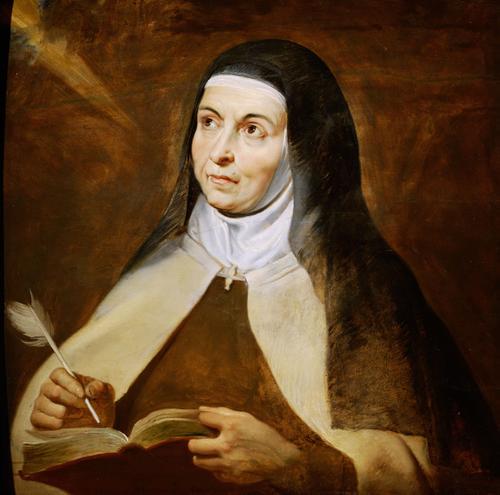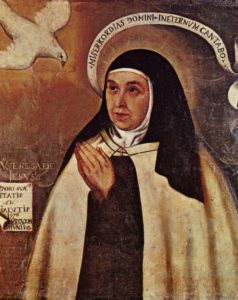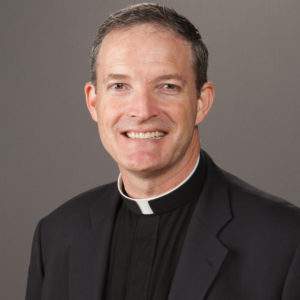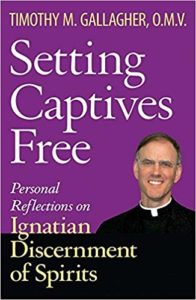Podcast: Play in new window | Download (Duration: 31:26 — 21.7MB) | Embed
Subscribe: Apple Podcasts | Spotify | Amazon Music | Android | Pandora | iHeartRadio | JioSaavn | Podchaser | Gaana | Podcast Index | Email | TuneIn | Deezer | Anghami | RSS | More

St. Teresa of Avila, Part 2 – The Doctors of the Church: The Charism of Wisdom with Dr. Matthew Bunson
- Born: March 28, 1515, Gotarrendura, Spain
- Died: October 4, 1582, Alba de Tormes, Spain
- Nationality: Spanish
Dr. Matthew Bunson and Kris McGregor continue their look into the life, spirituality, and teachings of St. Teresa of Avila; her profound insights on prayer and the Christian journey towards holiness, and her view of prayer as an “exercise of love,” wherein true prayer entails a deep, loving relationship with God. St. Teresa, often misunderstood as simply mystical, rooted her spirituality in the Church and its sacraments. She sought not only personal sanctity but also communal guidance, sharing her wisdom with family, laypeople, and her Carmelite sisters.
St. Teresa’s progression from the “four waters” in her early work, The Life, to the “interior castle” in her later years reflects an evolving understanding of the spiritual life. This journey, as she outlines, requires humility, persistence, and a deep commitment to the sacraments. Teresa’s experiences, particularly her “interior castle” model, demonstrate that as one grows in prayer, there’s a structured journey with different stages of spiritual development, each needing discipline and grace.
For more on St. Teresa of Avila and her teachings, visit her Discerning Hearts page
Discerning Hearts Reflection Questions
- How can you approach prayer as an exercise of love and deepen your relationship with God in your daily life?
- Reflect on the Trinitarian nature of God’s love; how does this inspire you to share love with others?
- In what ways do the sacraments of the Church support your spiritual journey and deepen your prayer life?
- How can you cultivate humility as you strive to grow closer to God, avoiding pride in your prayer life?
- What steps can you take to begin or deepen your practice of prayer using St. Teresa’s guidance?
- As you reflect on Teresa’s stages of spiritual growth, where do you feel you are in your journey, and how can you continue to grow?
- How can you surrender your desires to align more closely with God’s will for you?
- What insights from Teresa’s “Interior Castle” can help you recognize and appreciate the stages of your own spiritual life?
- How do you protect yourself from spiritual pride, especially when experiencing deeper moments in prayer?
- How can you use the strength you gain from prayer to serve others, as Teresa encourages?
From Vatican.va, an excerpt from the teachings of Pope Benedict XVI
 From the General Audience on St. Teresa of Avila
From the General Audience on St. Teresa of Avila
“It is far from easy to sum up in a few words Teresa’s profound and articulate spirituality. I would like to mention a few essential points. In the first place St Teresa proposes the evangelical virtues as the basis of all Christian and human life and in particular, detachment from possessions, that is, evangelical poverty, and this concerns all of us; love for one another as an essential element of community and social life; humility as love for the truth; determination as a fruit of Christian daring; theological hope, which she describes as the thirst for living water. Then we should not forget the human virtues: affability, truthfulness, modesty, courtesy, cheerfulness, culture.
Secondly, St Teresa proposes a profound harmony with the great biblical figures and eager listening to the word of God. She feels above all closely in tune with the Bride in the Song of Songs and with the Apostle Paul, as well as with Christ in the Passion and with Jesus in the Eucharist. The Saint then stresses how essential prayer is. Praying, she says, “means being on terms of friendship with God frequently conversing in secret with him who, we know, loves us” (Vida 8, 5). St Teresa’s idea coincides with Thomas Aquinas’ definition of theological charity as “amicitia quaedam hominis ad Deum”, a type of human friendship with God, who offered humanity his friendship first; it is from God that the initiative comes (cf. Summa Theologiae II-II, 23, 1).
Prayer is life and develops gradually, in pace with the growth of Christian life: it begins with vocal prayer, passes through interiorization by means of meditation and recollection, until it attains the union of love with Christ and with the Holy Trinity. Obviously, in the development of prayer climbing to the highest steps does not mean abandoning the previous type of prayer. Rather, it is a gradual deepening of the relationship with God that envelops the whole of life.
Rather than a pedagogy Teresa’s is a true “mystagogy” of prayer: she teaches those who read her works how to pray by praying with them. Indeed, she often interrupts her account or exposition with a prayerful outburst.
Another subject dear to the Saint is the centrality of Christ’s humanity. For Teresa, in fact, Christian life is the personal relationship with Jesus that culminates in union with him through grace, love and imitation. Hence the importance she attaches to meditation on the Passion and on the Eucharist as the presence of Christ in the Church for the life of every believer, and as the heart of the Liturgy. St Teresa lives out unconditional love for the Church: she shows a lively “sensus Ecclesiae”, in the face of the episodes of division and conflict in the Church of her time.
She reformed the Carmelite Order with the intention of serving and defending the “Holy Roman Catholic Church”, and was willing to give her life for the Church (cf. Vida, 33,5).
A final essential aspect of Teresian doctrine which I would like to emphasize is perfection, as the aspiration of the whole of Christian life and as its ultimate goal. The Saint has a very clear idea of the “fullness” of Christ, relived by the Christian. At the end of the route through The Interior Castle, in the last “room”, Teresa describes this fullness, achieved in the indwelling of the Trinity, in union with Christ through the mystery of his humanity.”
For more visit Vatican.va
For more from Dr. Matthew Bunson, check out his Discerning Hearts page.
Dr. Matthew E. Bunson is a Register senior editor and a senior contributor to EWTN News. For the past 20 years, he has been active in the area of Catholic social communications and education, including writing, editing, and teaching on a variety of topics related to Church history, the papacy, the saints and Catholic culture. He is faculty chair at Catholic Distance University, a senior fellow of the St. Paul Center for Biblical Theology, and the author or co-author of over 50 books including The Encyclopedia of Catholic History, The Pope Encyclopedia, We Have a Pope! Benedict XVI, The Saints Encyclopedia and best-selling biographies of St. Damien of Molokai and St. Kateri Tekakwitha.








